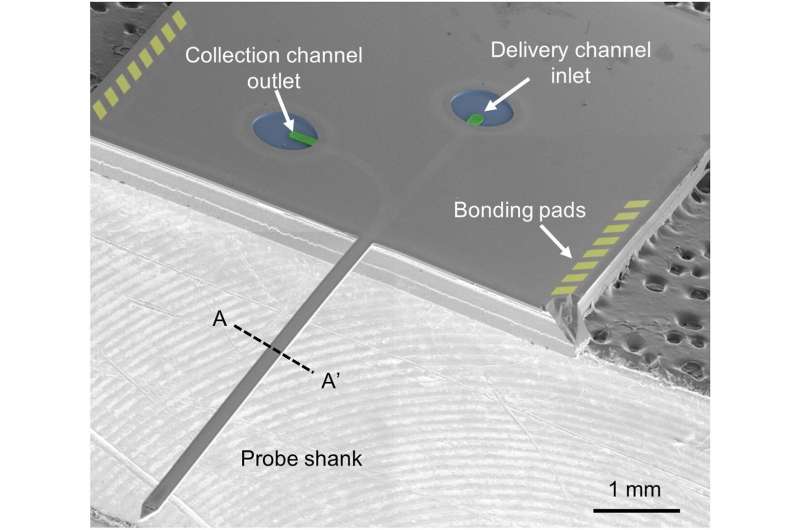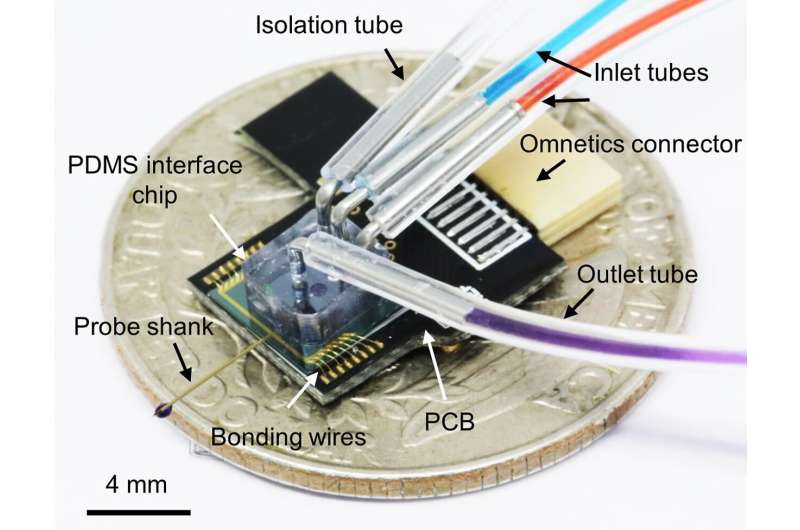Subminiature multifunctional brain chip analyzes brain activity from multiple aspects

Neurotransmitters play a key role in the signal transmission process between neurons in the brain. If the concentration of neurotransmitters is higher or lower than normal, it triggers brain diseases for which neurotransmitters are injected as treatments. Therefore, the accurate measurement of neurotransmitter concentration is crucial for investigating the cause or during the treatment of brain diseases.
Previously, neurotransmitter concentrations were measured by inserting a 0.5 mm cerebrospinal fluid tube in the brain. This method could damage brain tissues, and the tube, which is attached to several brain sections, impedes the analysis of neurotransmitters in specific segments. Moreover, the correlation analysis between neurotransmitters and brain activity has been challenging as the brain signals that are the main indicators of normal brain activity could not be measured.
A research team led by Dr. Il-Joo Cho at the Brain Science Institute of the Korea Institute of Science and Technology (KIST, President Seok-jin Yoon) announced that they had developed a subminiature multifunctional brain chip that integrated the fluid channel for extracting cerebrospinal fluid, the fluid channel for injecting medicine, and the electrodes that measure brain signals, to overcome the limitations.
The research team had previously published an article in an international journal regarding their development of the world's first brain chip that can simultaneously inject medicine and measure signals. They also integrated a fluid tube for extracting the cerebrospinal fluid as they considered it critical to analyzing brain activity as well as brain signals. The developed chip is 1/8th the size of the current commercial cerebrospinal fluid extraction device, minimizes the damage of brain tissues during the insertion process, and enables a precise analysis of brain activities by observing neurotransmitters and brain signals. Furthermore, the cerebrospinal fluid is extracted at a low pressure through the small fluid tube to minimize channel blockages occurring from prolonged use.

They inserted the multifunctional brain chip into a living mouse to extract its cerebrospinal fluid and measure brain signals. After injecting a substance that controls the neurological activity into the mouse, the neurotransmitter and brain signal change were examined over time to verify the substance's treatment effect from multiple aspects. Consequently, the developed brain chip was confirmed as a new tool that can potentially verify the medicine for brain disease treatment.
Dr. Il-Joo Cho said, "The new brain chip is small, yet it can perform functions simultaneously. It will be useful in minimizing brain damage and studying the cause and treatment for brain diseases. We expect that the system we developed will be applied to brain disease model animals and contribute to developing treatment for brain diseases."
More information: Uikyu Chae et al, Bimodal neural probe for highly co-localized chemical and electrical monitoring of neural activities in vivo, Biosensors and Bioelectronics (2021). DOI: 10.1016/j.bios.2021.113473




















